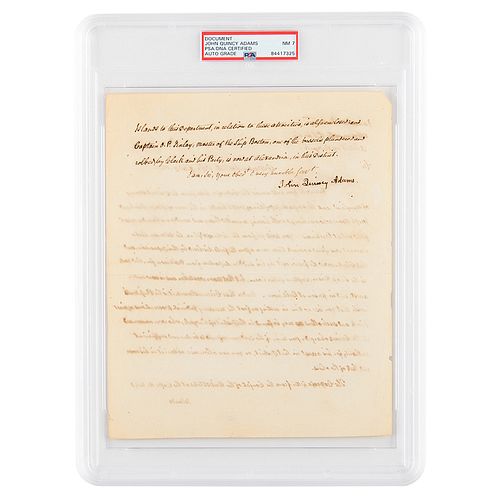John Quincy Adams Letter Signed - PSA NM 7
Two ways to bid:
- Leave a max absentee bid and the platform will bid on your behalf up to your maximum bid during the live auction.
- Bid live during the auction and your bids will be submitted real-time to the auctioneer.
Bid Increments
| Price | Bid Increment |
|---|---|
| $0 | $5 |
| $50 | $10 |
| $200 | $25 |
| $500 | $50 |
About Auction
Sep 22, 2022
RR Auction support@rrauction.com
- Lot Description
LS, one page both sides, 7.75 x 9.5, February 4, 1819. Letter to Jonathan Fisk, US Attorney for the District of New York. In full: "Herewith you will receive the copy of a letter from the District Attorney of Maryland and the original Deposition of Joseph Almeda in the case of George Clark and Joseph Moon who are charged with having committed Piracy and Murder on board a vessel fitted out at Baltimore—You will see from the letter of Mr. Glenn, the Attorney, that a warrant was issued against these men upon the facts disclosed by this Deposition and that Clark evaded the service of it by his sudden departure from Baltimore for New York in the sloop Hiram, Captain Luther Evans, but that Moon was taken, and is now under arrest, and in prison in Baltimore. Under these circumstances, it is the President's wish that you lose no time in setting on foot the necessary judicial prosecutions against Clark and such others as may be found in the District of New York, who were concerned in the Crimes charged upon him, if the evidence referred to be deemed sufficient authority for his arrest in the District, or you can otherwise obtain it in his case and that of the others.
The Copy of a Letter from the Consul of the United States at the Cape de Verd Islands to this Department, in relation to these atrocities, is also enclosed and Capt. O. P. Finlay, Master of the Ship Boston, one of the vessels plundered and robbed by Clark and his party, is now at Alexandria, in this District." In fine condition. Encapsulated and graded by a PSA/DNA as "NM 7."
Having struggled to gain control of international piracy, actively fighting with the Barbary States as recently as 1816, the US held no tolerance for such activities from its own citizens. The month after signing this letter, Secretary of State John Quincy Adams saw the passage of the Act to Protect the Commerce of the United States and Punish the Crime of Piracy, asserting that 'if any person or persons‰Û_commit the crime of piracy, as defined by the law of nations‰Û_[he] shall afterwards be brought into or found in the United States‰Û_ [and] upon conviction thereof‰Û_be punished by death.' Records show that the aforementioned George Clark, despite his attempt to flee Baltimore for the safety of New York, was found and convicted, and on May 12, 1820, publicly hanged for his crimes. An interesting glimpse into the interstate cooperation that enabled the new nation to enforce its laws, signed the same year that Adams negotiated the historic Florida Treaty with Spain. - Shipping Info
-
Bidder is liable for shipping and handling and providing accurate information as to shipping or delivery locations and arranging for such. RR Auction is unable to combine purchases from other auctions or affiliates into one package for shipping purposes. Lots won will be shipped in a commercially reasonable time after payment in good funds for the merchandise and the shipping fees are received or credit extended, except when third-party shipment occurs. Bidder agrees that service and handling charges related to shipping items which are not pre-paid may be charged to a credit card on file with RR Auction. Successful international Bidders shall provide written shipping instructions, including specified Customs declarations, to RR Auction for any lots to be delivered outside of the United States. NOTE: Declaration value shall be the item’(s) hammer price and RR Auction shall use the correct harmonized code for the lot. Domestic Bidders on lots designated for third-party shipment must designate the common carrier, accept risk of loss, and prepay shipping costs.
-
- Buyer's Premium



 EUR
EUR CAD
CAD AUD
AUD GBP
GBP MXN
MXN HKD
HKD CNY
CNY MYR
MYR SEK
SEK SGD
SGD CHF
CHF THB
THB












